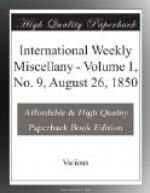“I wonder,” observed Uncle Bagges, “what has made you such a bright youth.”
“Taking after uncle, perhaps,” retorted his nephew. “Don’t put my candle and me out. Well, carbon, or charcoal is what causes the brightness of all lamps, and candles, and other common lights; so, of course, there is carbon in what they are all made of.”
“So carbon is smoke, eh? and light is owing to your carbon. Giving light out of smoke, eh? as they say in the classics,” observed Mr. Bagges.
“But what becomes of the candle,” pursued Harry, “as it burns away? where does it go?”
“Nowhere,” said his mamma, “I should think. It burns to nothing.”
“Oh, dear, no!” said Harry, “everything—everybody goes somewhere.”
“Eh!—rather an important consideration, that,” Mr. Bagges moralized.
“You can see it goes into smoke, which makes soot, for one thing,” pursued Harry. “There are other things it goes into, not to be seen by only looking, but you can get to see them by taking the right means,—just put your hand over the candle, uncle.”
“Thank you, young gentleman, I had rather be excused.”
“Not close enough down to burn you, uncle; higher up. There—you feel a stream of hot air; so something seems to rise from the candle. Suppose you were to put a very long slender gas-burner over the flame, and let the flame burn just within the end of it, as if it were a chimney,—some of the hot steam would go up and come out at the top, but a sort of dew would be left behind in the glass chimney, if the chimney was cold enough when you put it on. There are ways of collecting this sort of dew, and when it is collected it turns out to be really water. I am not joking, uncle. Water is one of the things which the candle turns into in burning,—water coming out of fire. A jet of oil gives above a pint of water in burning. In some lighthouses they burn, Professor Faraday says, up to two gallons of oil in a night, and if the windows are cold the steam from the oil clouds the inside of the windows, and, in frosty weather, freezes into ice.”
“Water out of a candle, eh?” exclaimed Mr. Bagges. “As hard to get, I should have thought, as blood out of a post. Where does it come from?”
“Part from the wax, and part from the air, and yet not a drop of it comes either from the air or the wax. What do you make of that, uncle?”
“Eh? Oh! I’m no hand at riddles. Give it up.”
“No riddle at all, uncle. The part that comes from the wax isn’t water, and the part that comes from the air isn’t water, but when put together they become water. Water is a mixture of two things then. This can be shown. Put some iron wire or turnings into a gun barrel open at both ends. Heat the middle of the barrel red-hot in a little furnace. Keep the heat up, and send the steam of boiling water through the red-hot gun barrel. What will come out at the other end of




